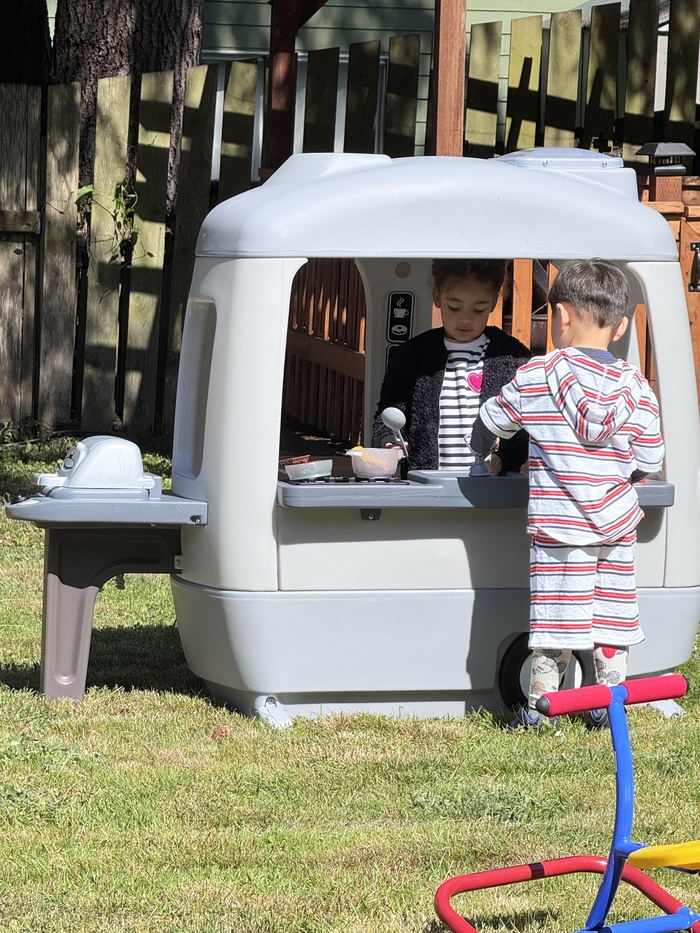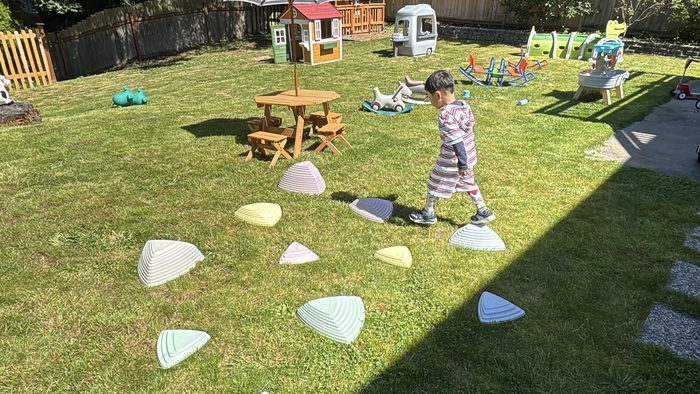Imaginative play is a vital part of childhood, boosting creativity, social skills, and cognitive growth. It helps kids problem-solve, express emotions, and develop physically through fun, pretend scenarios.
What Is Imaginative Play?
Imaginative play, often called pretend play or make-believe, is when children use their creativity to act out scenarios, roles, or stories. Whether they’re pretending to be superheroes, cooking in a play kitchen, or exploring a magical forest, imaginative play allows kids to create their own worlds. This type of play is unstructured, driven by a child’s imagination, and often involves role-playing, storytelling, or inventing new games.For young children, including those in infant care or home day care settings, imaginative play is a natural way to explore their environment, express emotions, and make sense of the world. It’s more than just fun—it’s a critical part of healthy development.
Why Imaginative Play Matters for Child Development
Imaginative play is a cornerstone of early childhood development. It provides a safe space for children to experiment with ideas, emotions, and social interactions. Research shows that kids who engage in regular pretend play develop stronger cognitive, emotional, and social skills, which lay the foundation for success in school and beyond.In child care environments, such as daycare or home-based programs, imaginative play is often encouraged through storytelling, dress-up games, and creative activities. These experiences help children build confidence, resilience, and the ability to think outside the box.

Key Benefits of Imaginative Play for Kids
Imaginative play offers a wide range of benefits that support a child’s growth in multiple areas. Below, we explore the top advantages of pretend play and how it shapes well-rounded development.
Boosts Creativity and Problem-Solving Skills
Imaginative play encourages children to think creatively and come up with original ideas. When a child pretends to be a doctor or builds a castle out of blocks, they’re solving problems, making decisions, and inventing solutions. For example, they might figure out how to “fix” a toy patient or create a new rule for their imaginary game.This creative thinking translates into real-world problem-solving skills. Kids learn to approach challenges with flexibility and innovation, which are essential for academic and professional success later in life.
Enhances Social and Emotional Development
Pretend play often involves collaboration, whether it’s with peers in a daycare setting or siblings at home. Children take on different roles, negotiate rules, and practice empathy by stepping into someone else’s shoes. For instance, playing “family” helps kids understand different perspectives and emotions, fostering compassion and emotional intelligence.Imaginative play also allows children to process complex feelings. A child acting out a scenario where they’re a superhero saving the day might be working through fears or building self-confidence.
Supports Cognitive Growth
Imaginative play stimulates brain development by engaging memory, planning, and critical thinking. When children create elaborate storylines or build imaginary worlds, they practice organizing their thoughts and making connections. These activities strengthen executive function skills, such as focus, self-control, and decision-making.In infant care and preschool settings, imaginative play also introduces early math and science concepts. For example, stacking blocks to build a tower teaches spatial awareness, while pretending to run a store introduces basic counting and money concepts.
Promotes Physical Development
While imaginative play is often associated with mental benefits, it also supports physical growth. Running around as a pirate, dancing like a ballerina, or crawling through a “jungle” helps children develop fine and gross motor skills. These activities improve coordination, balance, and strength, which are crucial for young children’s physical health.In home day care environments, caregivers can incorporate movement-based pretend play, such as obstacle courses or dance parties, to keep kids active and engaged.
Encourages Language and Communication Skills
Imaginative play is a natural way for children to expand their vocabulary and practice communication. When kids narrate their play or talk to imaginary friends, they experiment with new words, sentence structures, and storytelling techniques. Group play, such as in a daycare setting, also encourages listening and responding to others, which builds strong interpersonal communication skills.For younger children in infant care, simple pretend play activities like peek-a-boo or singing songs with gestures lay the groundwork for language development.

How to Encourage Imaginative Play at Home or in Daycare
Parents and caregivers play a vital role in fostering imaginative play. Here are practical ways to encourage pretend play in any setting, whether at home or in a child care program.
Create a Play-Friendly Environment
Set up a dedicated space where children feel free to explore their imagination. This could be a corner of the living room or a play area in a daycare facility. Include props like costumes, toy tools, or cardboard boxes that spark creativity. Ensure the space is safe and free from distractions, allowing kids to focus on their play.
Provide Open-Ended Toys and Props
Open-ended toys, such as building blocks, dolls, or art supplies, are perfect for imaginative play because they can be used in countless ways. Unlike toys with specific functions, open-ended materials encourage kids to invent their own games and stories. For example, a simple scarf can become a superhero cape, a magic carpet, or a tent.
Incorporate Imaginative Play in Daily Routines
Imaginative play doesn’t require special equipment—it can be part of everyday activities. Turn bath time into a pirate adventure or pretend the grocery store is a treasure hunt. In home day care settings, caregivers can weave pretend play into group activities, like acting out a story during circle time.
The Role of Daycare in Fostering Imaginative Play
High-quality daycare programs prioritize imaginative play as part of their curriculum. Caregivers in these settings create structured yet flexible environments where children can explore their creativity through group activities, storytelling, and hands-on projects. These programs often use play-based learning to teach social skills, problem-solving, and emotional regulation.For infants, infant care providers use sensory-based pretend play, such as puppet shows or musical games, to stimulate early development. In home day care settings, small group sizes allow for personalized attention, ensuring each child’s unique interests are nurtured through play.By fostering imaginative play, daycare programs help children build a strong foundation for lifelong learning and emotional well-being.
Nurture Your Child’s Imagination with Kido Heaven
Imaginative play is more than just a fun activity—it’s a powerful tool for helping children grow into creative, confident, and capable individuals. By encouraging pretend play at home or in a supportive child care environment, you’re giving your child the opportunity to develop essential skills that will benefit them for years to come.At Kido Heaven, we understand the importance of imaginative play in early childhood development. Our daycare in Bothell and child care in Bothell programs are designed to spark creativity and foster growth through play-based learning. Whether you’re looking for a nurturing home day care or specialized infant care, our experienced caregivers create a warm, engaging environment where your child can thrive. Contact Kido Heaven today to learn how we can support your child’s development through the power of play!
📣 Call to Action:
Want to learn more or schedule a tour?
📞 Call us at 206-734-2040
🌐 Visit: www.kidoheaven.com
📍 We are a licensed family home daycare in Bothell, WA
We welcome you to join our growing family, where your child’s safety and development come first.
Follow Our Mealtime Moments
Stay updated with more beautiful outdoor meals and daily learning routines on:
Instagram | Facebook | Nextdoor | Yelp | Winnie | YouTube | Upwards
FAQ
1. What age is best for imaginative play?
Imaginative play can begin as early as infancy with simple games like peek-a-boo. It becomes more complex around ages 2–3, when children start creating stories and role-playing. However, kids of all ages benefit from pretend play.
2. How can I encourage my shy child to engage in imaginative play?
Start with low-pressure activities, like playing with dolls or drawing a story together. Follow your child’s lead and offer gentle prompts to spark their imagination. Joining in the play can also help them feel more comfortable.
3. Are there specific toys that promote imaginative play?
Yes, open-ended toys like blocks, dress-up clothes, and art supplies are ideal. Avoid toys with rigid instructions, as they can limit creativity.
4. How does imaginative play differ in daycare versus home settings?
In daycare, imaginative play often involves group activities and peer interaction, fostering social skills. At home, play is more individualized, allowing for deeper exploration of personal interests.
5. Can imaginative play help with school readiness?
Absolutely! Imaginative play builds cognitive, social, and emotional skills that prepare children for academic challenges, such as problem-solving, collaboration, and self-regulation.


